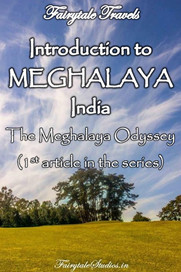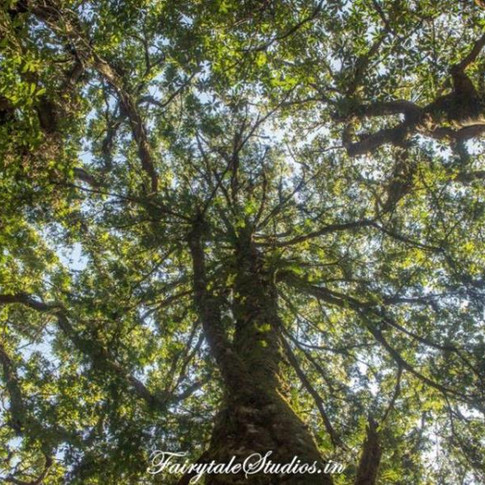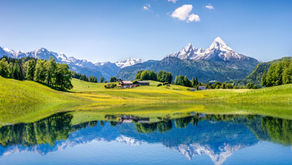Travel Guide to Mawphlang - The Meghalaya Odyssey
The magical charm of the Northeast India still remains a best kept secret. Known as the land of living root bridges and natural swimming pools, Meghalaya is a heavenly state filled with life in woods, spectacular waterfalls and wonderful trekking trails. It keeps surprising you at every step of the way. Mawphlang is one such small village in Meghalaya which left us in awe. Just a short trip from Shillong, enroute towards Cherrapunjee or Mawsynram, we thought Mawphlang was a small halt with just 4 attractions. But these 4 attractions, especially Mawphlang sacred grove made us regret our decision of not spending a night here. Read our travel guide to know what is so special about Mawphlang in Meghalaya and why you should definitely visit it.

In this fourth blog of the series – The Meghalaya Odyssey, we present a detailed travel guide to a village named Mawphlang pronounced Maw - phlang (Maw rhymes with Law), which is a small village located about 25 kilometers from the capital city of Meghalaya, Shillong.
'The Meghalaya Odyssey' is a series of 10 travel blogs and 2 photo blogs. Check out other blogs in the series by clicking on the below mentioned links or photographs:
4. Mawphlang Travel guide - This article
In this blog we proceed from Shillong towards Cherrapunjee where enroute you will find a small village named Mawphlang. You might recall from our first article in series where we introduce you to Meghalaya that Khasi is the biggest tribe in Meghalaya, others being Garos and Jaitias. The Khasi tribe in Meghalaya worship the beauty that nature has bestowed on them and the spirit of conservation is deeply embedded in the people probably rooted in several religious beliefs. The tribes are quite sentimental when it comes to preserving the natural environment. As per their belief, every village is incomplete and has no identity without its own sacred forest. One of the most popular sacred forest of Meghalaya lies in a village named Mawphlang. Apart from the sacred forest, Mawphlang also flaunts a some great landscapes thanks to beautiful river and dam, Khasi Heritage village and the very famous David Scott's trail. Read on to know more about all these places and download an interactive map to see the exact locations of all places including the complete trail.
In Khasi language, ‘Maw’ means stone and ‘Phlang’ means grass – hence Mawphlang is known as the land of endless grassy stones. Mawphlang gave us feel of a fictional story and everything we saw and experienced was just like we were in the movies.
How to Reach Mawphlang
Mawphlang is just 25 kilometers from Shillong, the capital city of Meghalaya state. It is advisable to hire a car from Shillong to reach Mawphlang. If you are on a full week Meghalaya trip, we hope you have hired a self drive or cab from Guwahati. In case you are short on budget, any shared vehicle starting from Shillong or government buses going towards Cherrapunji and Mawsynram will pass through Mawphlang. You will then have to walk a bit to cover the various sightseeing spots.
Best Time to visit Mawphlang
The places to see in Mawphlang is the village, a sacred forest, dam and David Scott's trail. Each of these involves walking and easy trekking. Hence, it is advisable to visit in the months of Oct-Apr when the weather is pleasant and it does not rain.
Duration of stay in Mawphlang
All the places to visit in Mawphlang can be covered while moving from Shillong to Cherrapunji. However, we would recommend spending one night in Mawphlang if you are into Yoga or natural beauty. Experiencing the beauty of sacred forest early in the morning would definitely appeal to you. Others can visit the sacred forest during day in 2-3 hours and move on to other places. If you stay in Mawphlang for a night, you will also be able to do a complete trek of the sacred forest. Read on to know more.
Places to visit in Mawphlang

Mawphlang Dam
Mawphlang Dam is built over Umiew River and is the main source of water supply to Shillong. The dam can be viewed from the viewing point at the top of a hill after descending a few steps from the parking area. The dam is huge and is covered by greenery all around and the sight of the shining blue-green water of the Umiew river from the top is breathtaking. One can also climb down or drive to the river. This viewpoint is located just 1-2 kilometres off road and hence could be reached easily. There is also another great view point which shows the complete valley and the Umiew river (refer first picture in this article). There is no name for this location but we call it Umiew river view point and you can find the exact location in downloadable maps (details at end of article).
Note: The viewing point is not covered by railings and is dangerous. It is advisable not to visit it with kids. In case you have more time, you could also climb or drive down to the river.
Mawphlang Sacred Forest
There are several sacred forests in Jaintia hills part of Meghalaya but Mawphlang sacred forest is the most well-known. It is also famously known as Mawphlang Sacred Grove. Once you park your vehicles near Khasi heritage village gate, you can hire a guide who will take you to the forest. We would definitely recommend hiring a guide as they will provide many interesting information such as significance of the forest, traditions, rare plants and their uses etc. and would readily answer any query you might have. For those who do not take a guide, this whole place is just a plain forest with trees. There are two options for forest trek – Half trek which takes around 1-1.5 hours and Full trek which takes around 4 hours (if you choose to go deeper in the forest). Half trek is adequate for those who are visiting Mawphlang as a halt and have shortage of time. You do not miss out much by doing a half trek. The terrain is flat with hardly any slope and is pretty easy even for elderly.

Our guide McDuff, was a local English speaking boy probably in his early 20s. McDuff unveiled the history of the forest to us. He was like a living library of knowledge and talked confidently about the folktales, history and legends of the sacred grove. Standing right outside the grove, he explained that the sacred forest is protected by a local deity named Labasa, who is believed to protect their village and the community. In times of need, such as illness, flood or drought, animal sacrifices were performed for the deity at the stone temples built inside the forest. When the deity is happy, it appears in the form of a leopard and when it is angry, it appears as a snake. If anyone enters the forest with bad intention, they face dreadful consequences. We realized through all these stories how important this forest was for McDuff's community. They worshipped and protected it just like religions do for their gods. They charge an entrance fee so that they can maintain the forest and plant saplings. Even when Indian prime minister Narendra Modi visited Mawphlang sacred forest, the community ensured he pays the entrance fee. They said - no one is above the forest, no one is above nature.
As McDuff pointed towards the entrance of the sacred grove, all we could see was a thick green frame surrounded by plain grass slopes on the outside. The entrance seemed like a tunnel full of foliage and as we entered, we were hit by lots and lots of greenery. Our eyes took a while to adjust to the dim light and as soon as we were fine-tuned, we felt like being in a movie – similar to Jurassic Park or rather Avatar. We were in the Pandora forest! The grove is like Nature’s own museum - full of varied varieties of plants, ferns, flowering trees, orchids, butterflies and wildflowers.

We slowly walked on the carpet of leaves, ferns and twigs as McDuff started narrating another story. He said – ‘You cannot take anything out of this sacred forest; not even a leaf’. The one who disrespects this rule, faces the wrath of local deity. Whoever has attempted to break this rule have been punished physically or psychologically by illness or death. This explains how the forest has survived unharmed since 1000’s of years. Anything that is killed, picked or taken from inside the forest is to be eaten, consumed or used within the forest. In other words, what happens in the Mawphlang forest stays in the forest! We realized these stories and beliefs are deeply rooted in people of Khasi tribe's heart. Though these may sound superstition to outsiders, every culture or religion has some such stories and beliefs inculcated into the very DNA of its people. Importance of nature and leading a life in harmony with it was clearly one such belief Khasi kids seem to grow up with. We wish rest of the world could took inspiration from such beliefs and did more for the mother earth.

Innumerous trees stood proudly inside the forest, having had no amputation from man. The trees were heavily covered with lichens, ferns, orchids, mushrooms and mosses. Some varieties are not found anywhere else in the world. Some trees, believed to be 1000 years old, are said to have cure for diseases like cancer, tuberculosis, etc. A giant tree of Rudraksh, seed of which is used for religious ceremony, is held very sacred and it is believed that if you wish something with a pure heart touching the tree, the wish will be fulfilled. Covering 80 hectares of land, as many as 450 species of trees and plants inhabits the Mawphlang forest. As we moved deeper in the forest, we saw monoliths, which represented places of sacrifice. The fallen trunks of trees, gurgling streams of water and hidden spaces among the trees made us realize that there is no trace of outside world in the forest. Even the Sun had to face difficulty peeping through the complex roof of the intertwined branches. McDuff pointed to a kind of algae saying that it glows in night and we were compelled to think about a glowing magical forest similar to the one in the movie – Life of Pie. You see, the forest reminded us of so many movies! It is indeed an amazing visual spectacle that all the nature lovers would certainly love.
Note: As the Sacred forest is all about culture, history and local stories, we recommend hiring a forest guide. The English speaking locals of the village serve as guides who charge around INR 300 or more if you wish to go deeper into the forest. Entrance to the forest is open from 9:00 AM till 4:30 PM daily. However you can get permission to enter early in the morning with guides to do Yoga or meditate. Entrance fee to the forest is INR 20 per person and INR 20 for camera.
Khasi / Mawphlang Heritage Village
Right opposite to the Mawphlang Sacred forest, near the parking, lies a small village area called as the Khasi Heritage village. This village has been set up by the Khasi Hills Autonomous District council. Various types of traditionally constructed Khasi style huts have been showcased in the village. The huts are authentically made by the local tribes using bamboo and thatch. A huge platform resembling an auditorium has also been constructed. The slopes are connected with metal bridges. A few monolith stones placed in the big campus seemed to be used as place for worship or public gatherings.
People of Khasi tribe gather each year at this Heritage village to celebrate nature. Each year a two day Monolith festival is organised here that showcases their traditional food, dances and folk music. The festival showcases the tribal heritage and culture and is a platform for everyone to reunite. Many tourists flock this area during the festival time which takes place around March-April, however the festival didn't take place in 2018.

David Scott's Trail
If you are into trekking, David Scott's trail is the best Meghalaya can offer you. A British administrator David Scott had discovered a 100 kms route leading from Assam to Bangladesh in 1800s which was then a mule track spanning 5 days. Today the original trail is separate into many shorter routes but this 16 kms stretch between 2 villages - Mawphlang and Ladmawphlang is the most famous one and called David Scott's trail. Though the trail can be covered from either direction, Mawphlang is considered the starting point and you would find many guides here. There are many sign boards along the trail and you would come across few villages, however it is preferable to hire a guide as there have been cases of people getting lost or taking a much longer route and finding it all the more difficult.
David Scott's trail is mainly popular because of scenic views. The trail includes walking on mud paths in forest and meadows, crossing river streams on foot and on wooden bridge, passing by lovely villages and smiling locals, cascading waterfalls and serene valleys. It is highly suggested you do not go for David Scott's trail in monsoon as the path is too slushy and the river may have too much water for you to cross. Leeches too would play havoc with you. Once monsoon recedes in October-November, the trek would be much more enjoyable. Winter from December to early April is also preferred though most waterfalls would have dried up. Do ensure you take water, offline google maps of this area and good sports or trekking shoes for this trail. You would not find any internet connectivity on the trail. David Scott trail can be covered in 4-6 hours depending on how fit you are.
Note - Scroll to the end of the article to download complete map of David Scott's trail which will be extremely useful to see offline in absence of internet.
Accommodation in Mawphlang
There are not many options to stay in Mawphlang as most tourist visit Mawphlang only for few hours. But as we mentioned earlier, if you are interested in Yoga or meditating inside Mawphlang sacred grove forest, you might want to visit the forest early in the morning and a night stay at Mawphlang might be preferable. There are just few homestays where you can stay namely Maple Pine farm and The misty meadows which one can book.
Mawphlang was thus a mix of interesting culture, nature and beautiful landscapes. If you are short of time, you can skip David Scott's trail and finish the rest in few hours. You might be able to cover the trail to and reach Cherrapunji but you would be too exhausted. But if you are staying for the night, visiting Sacred grove forest early in morning and David Scott's trail would make your day. In the end after visiting Mawphlang, we wished the world was more like this village where people cared for the nature around them.
PIN THIS IMAGE
How did you find our blog on Mawphlang? Have you ever visited any place that reminded you of any movies? Did you find Mawphlang interesting enough to include in your itinerary? Do let us know in the comment section below. Also, stay tuned to read and know about many such interesting places in Meghalaya in our blogs of the series – The Meghalaya Odyssey where you can find travel guides to Cherrapunjee and Mawlynnong.



















































































コメント